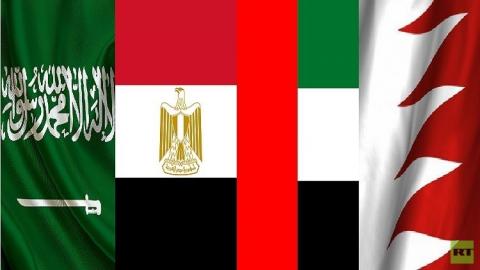Alwaght- Four Arab regimes demanded on Friday that Qatar downgrades ties with Iran, halt military cooperation with Turkey and shut the Al Jazeera TV channel as conditions to end a blockade on the Persian Gulf state.
According to media reports, the list of conditions Qatar needs to meet in order to mend ties with Saudi Arabia, United Arab Emirates, Egypt and Bahrain was reportedly passed on earlier in the day by Kuwait, which is mediating the dispute. Qatar and Kuwait have yet to confirm or deny the existence of the list.
The Financial Times, which saw the 13-point list, said Qatar has been given ten days to comply with the requirements, including the immediate shutdown of the Turkish military base on its soil and the Doha-based Al Jazeera as well as affiliated channels.
A look at the demands:
— Curb diplomatic ties with Iran and close some Qatari offices there. Kick members of Iran's Revolutionary Guard out of Qatar and cut off any joint military cooperation with Iran. Only trade and commerce with Iran that complies with US and international sanctions will be permitted.
— Sever all ties to "terrorist organizations" including the Muslim Brotherhood, the Islamic State group, al-Qaida, and Lebanon's Hezbollah. Formally declare those entities as terrorist groups.
— Shut down Al-Jazeera and its affiliate stations.
— Shut down news outlets that Qatar funds, directly and indirectly, including Arabi21, Rassd, Al Arabiya Al-Jadeed and Middle East Eye.
— Immediately terminate the Turkish military presence currently in Qatar and end any joint military cooperation with Turkey inside of Qatar.
— Stop all means of funding for individuals, groups or organizations that have been designated as terrorists by Saudi Arabia, the UAE, Egypt, Bahrain, the United States, Canada and other countries.
— Hand over "terrorist figures" and wanted individuals from Saudi Arabia, the UAE, Egypt and Bahrain to their countries of origin. Freeze their assets, and provide any desired information about their residency, movements and finances.
— End interference in sovereign countries' internal affairs. Stop granting citizenship to people who hold citizenship in Saudi Arabia, the UAE, Egypt and Bahrain. Revoke Qatari citizenship for existing nationals off those four countries if it violates those countries' laws.
— Stop all contacts with the political opposition in Saudi Arabia, the UAE, Egypt and Bahrain. Hand over all files detailing Qatar's prior contacts with and support for those opposition groups.
— Pay reparations and compensation for loss of life and other, financial losses caused by Qatar's policies in recent years. The sum will be determined in coordination with Qatar.
— Align itself with the other Persian Gulf and Arab countries militarily, politically, socially and economically, as well as on economic matters, in line with an agreement reached with Saudi Arabia in 2014.
— Agree to all the demands within 10 days of it being submitted to Qatar, or the list becomes invalid. The document doesn't specify what the countries will do if Qatar refuses to comply.
— Consent to monthly audits for the first year after agreeing to the demands, then once per quarter during the second year. For the following 10 years, Qatar would be monitored annually for compliance.
Qatar rejects accusations, dialogue under blockade
Qatar vehemently denies funding or supporting extremism. But the country acknowledges that it allows members of movements such as Palestinian Hamas to reside in Qatar, arguing that encouraging dialogue with such groups is crucial to resolving global crises.
The demand that Qatar cuts ties with neighboring Iran would prove extremely challenging. Qatar shares a massive offshore natural gas field with the Islamic Republic of Iran which supplies most of the country’s wealth making it the world's richest country per capita
The crazy demand of shutting the Doha-based al-Jazeera TV would be met with resistance not only by Qataris but by masses in the region as its one of the most widely watched Arabic channels known for airing alternative viewpoints.
A few days ago, Qatari Foreign Minister said the country won’t bargain away what it sees as its sovereign rights. “Negotiations should be done in a civilized way and should have a solid basis,” Mohammed Al Thani told reporters in Doha. “They have to lift the blockade and start negotiations.”



























